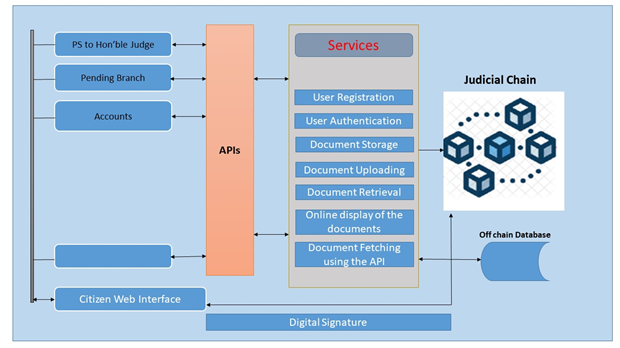
Blockchain can democratize access to the justice system by reducing complexity related to availability of Trusted, Immutable, time-stamped data and documents. Blockchain technology can be used under the following scenarios for the Judiciary

Judicial Deposits - Passbook in the Ledger : Under certain circumstances, a party is ordered to deposit the money with the court. The registry then puts the money in fixed deposits in the banks. At various stages in the hearing of the cases, the court might also order that a portion of the judicial deposit be given to the other party. The Registry in the courts maintains these ledgers. There are instances when the deposits are not claimed by the parties due to various reasons. Maintaining the judicial deposit transactions in the blockchain to ensure that it is not tampered and also initiating the processes of refund automatically will be another use case in the Judiciary.
Transfer of FIR, Charge-sheet & traffic challan data from the Police : The FIR and charge-sheet are issued by the Police. These documents need to be presented to the court within a stipulated time. The details of the FIR are captured in the case information system in the courts and then registered as a case. Sometimes, even though the charge sheet is not filed, the hearings can be made based on the FIR. The charge sheet is submitted by the police to the prosecution after validating the admissibility and then it is handed over to the court. The Court then acknowledges the receipt and the charge sheet is admitted. Instead, the police / traffic police department software can store the FIR, charge-sheet, traffic offence details & fine amount in the blockchain. This will facilitate the following :
Publishing the notices and summons to the parties served by the Police : The time and effort needed to issue summons and notices to parties can be greatly reduced by ensuring that the registry stores these documents in the blockchain and enables the police staff to download these without the need to visit the court every day.
Issue of bail orders by the Court : Bail orders issued by the court are required to be presented in prisons in the shortest possible time. Enabling the bail orders to be stored in Blockchain will facilitate in-time retrieval of the bail order document. The immutability of these documents ensures that the authorities at the prison and the parties involved can trust the digital document.
Use of land records & Registration data : The land records & registration data on the blockchain can be used by the Judiciary during the different stages in the case proceedings to check for the transaction details and ownership of the land or property.
Use of certificates and documents issued by Government departments : Certificates such as marks-sheet, admission orders, caste, income, Birth, death certificates that are stored by the issuing authorities in the Blockchain can be used by the Judiciary as proof of claims.
Forensics Reports : The eForensics reports that are relied upon by the Judiciary can be retrieved from the Blockchain.
Securing evidence : Digital evidence stored conventionally on a CD or pen drive is more susceptible to data loss. The disc may be damaged or misplaced, whereas the data stored on a centralized system could be tampered with more easily. Blockchain could be used for securing evidence to be presented in court proceedings such as screenshots of websites, photos or any other digital or digitized content, and contracts without getting tampered. Uploading evidence to the blockchain in real-time, allows for reliable sourcing as well as storage.
Bail Order from Ministry of Justice, have been getting recorded.
Anybody can verify the same using the
URL : https://certificatechain.nic.in
For More Information : Judiciary Chain Concept Paper